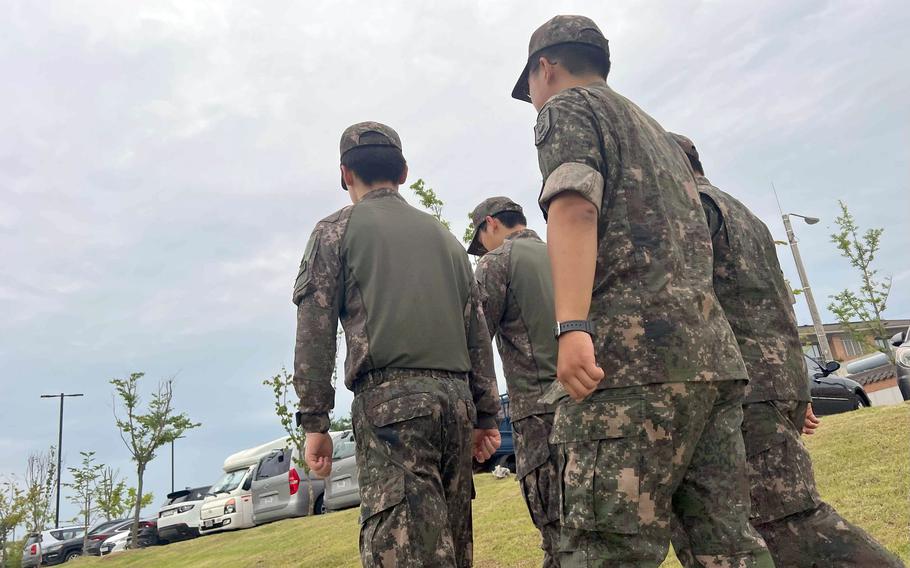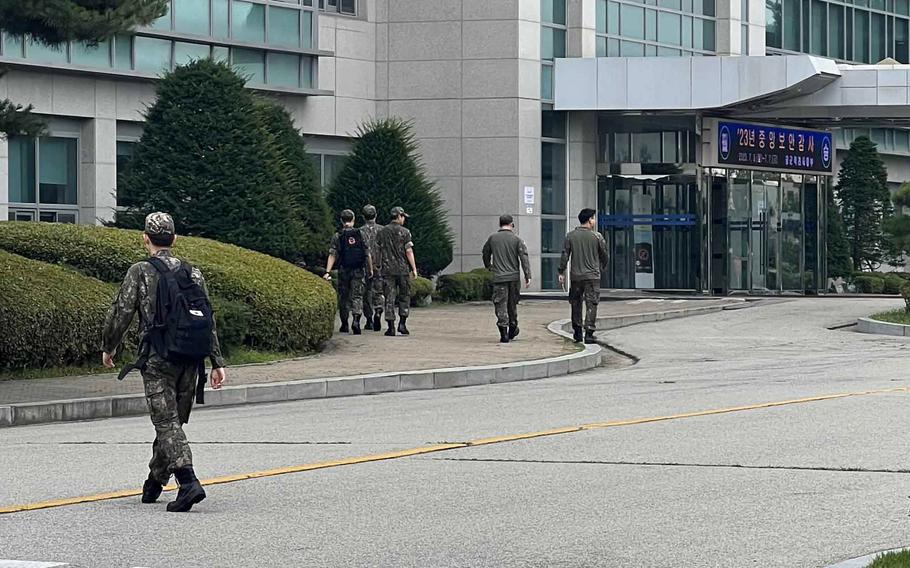
South Korean soldiers walk on the grounds of Camp Humphreys, South Korea, Friday, July 7, 2023. (Christopher Green/Stars and Stripes)
SEOUL, South Korea — A former South Korean army officer cleared of assault charges after slapping a subordinate on a U.S. military base in 2018 must stand trial again after the country’s highest court reversed an appellate court’s ruling.
The officer — identified as a colonel in South Korean media reports — was convicted in a military court of assault for lightly slapping a soldier five to eight times for failing to salute, according to a June 15 decision by the Supreme Court of Korea. The conviction carried a maximum two-year prison term.
The decision sends the case to the Seoul High Court for retrial.
Both soldiers served in the same unit that supported the U.S. armed forces, according to the supreme court decision. The incident occurred at an unspecified base in Pyeongtaek, home of the U.S. Army’s Camp Humphreys and the Air Force’s Osan Air Base.
Names, ranks and other information about the soldiers were redacted in the court filing. Except in extreme cases of “cruel” crimes, South Korean law protects the identity of the accused.
An appellate court in 2019 overturned the officer’s conviction, ruling the military law did not apply because the assault took place on a foreign country's base and the victim expressed a desire for the defendant’s acquittal.

South Korean service members walk toward the operations command building at Osan Air Base, South Korea, Thursday, July 6, 2023. (Christopher Green/Stars and Stripes)
A prosecutor must dismiss a criminal case if the victim does not wish to punish a wrongdoer, according to South Korean law.
Prosecutors in 2020 took their case to the Supreme Court of Korea, which overturned the appellate decision.
That the offense occurred on a U.S. base was irrelevant, the court ruled. A military base where South Korean troops conduct military operations “is the same as other military bases within the [South Korean] armed forces,” the decision states.
The high court also ruled that the victim’s desire not to prosecute does not apply to a crime committed on a military base.
“In military court, those involved in a case are supposed to be punished regardless of whether the victims and defendants reach an agreement,” Dongin Law Group attorney Chun Seungsoo, a retired South Korean navy judge advocate and a former prosecutor, told Stars and Stripes by phone Thursday.
Kim Hyungnam, director of the Seoul-based Center for Military Human Rights Korea, said he viewed the incident as an assault that needed to be prosecuted. Violence that was part of military life is no longer tolerated in South Korea, he said.
“Nowadays, folks disagree with assault in the armed forces,” Kim told Stars and Stripes by phone Thursday. “Many people view violence in the military as more problematic than violence outside of military life.”
Kim recalled the case of South Korean army Pfc. Yoon Seung-joo, 23, who died of asphyxiation in 2014 after six of his peers bullied and beat his chest as he was eating inside the barracks.
“Something like this was sort of normal in the South Korean military in the past; however, beatings in the military have decreased these days,” Kim said. “Something like this is a habit gaining acceptance in the military — but incidents like this must be eradicated in the armed forces.”